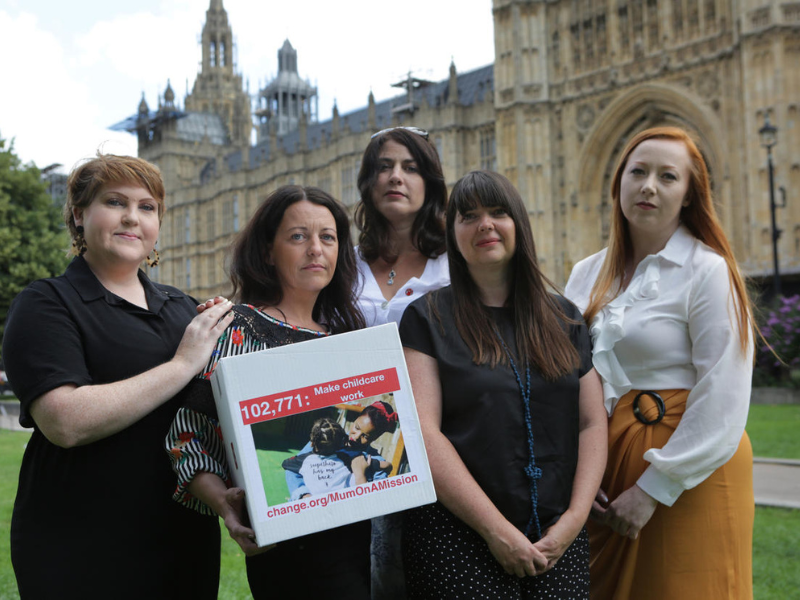Campaigners tell us that influencing government policy has become harder. There is increasing recognition that ‘wins’ are rarely a result of a single campaign. How do we define success or recognise progress in this environment? Save the Children’s Becca Lyon, Head of Child Poverty at Save the Children, gives her personal reflections on the childcare proposals in the recent Budget Statement.
Since Wednesday’s Budget, my campaigning and parenting socials have collided. Many are angry about half-baked plans. But many are also pausing to recognise where we’ve got to, and thankful for the campaigners whose tireless work means we’re on a better path (and, trust me, there’s still a very long and winding road ahead for childcare change).
Having campaigned on childcare for six years, I’m definitely a mixture of both. But I’m celebrating this moment because something’s shifted. We’ve finally got consensus that our childcare system in England – amongst the most expensive in the world – isn’t fit for purpose. This is the platform we’ve needed to be able to push for more.
How did we get here? What happened to move the conversation on? Because six months ago, just after I came back from maternity leave, I wouldn’t have dreamed that we’d see a Conservative Chancellor stand up and put childcare at the centre of his Budget. I’ve penned a few reflections which I hope spark debate amongst change-makers and help us take inspiration for all the other fights we have ahead. There will be things I’ve missed, and they’re my subjective views, rather than those of Save the Children.
1: The fact that spaces to organise existed at the point where parents had reached the end of their tether meant that parent anger didn’t turn to apathy, it turned into action.
Parents reached breaking point, probably in part because their childcare bills were going up at the same time as all their other bills – but rather than just grumble to each other in the park or at playgroup, they found a voice and got organised.
Some did this long ago, like the mums on a mission who clocked five years ago that the way childcare works in Universal Credit is outrageously unfair, and who Save the Children have supported. Other parents have looked to Pregnant then Screwed and found an authentic leader in Joeli Brearley, who is prepared to boldly take up the fight – with government, in the media, and on socials.
The point is that these networks, groups, and campaigns were already up and running, and able to welcome parents who felt the overwhelming need to ‘do something’.
2: The ‘childcare (in England) is a big problem’ narrative picked up pace.
This happened on two fronts: the rising cost to parents and the plight of nurseries battling to balance the books. Both became the subject of many media stories. Both became more pertinent against the grim backdrop of the cost-of-living crisis – when prices are rising on all fronts, it’s only sensible that we start to question a bill that’s sometimes over and above mortgage or rent payments. We have members of the childcare coalition led by the incredible Women’s Budget Group to thank for that.
And at the same time as the experiences of parents and childcare providers were being highlighted, potential solutions were proposed by think tanks like Onward UK and IPPR, supported by Save the Children and others.
3: Labour decided to make childcare a core issue.
A key voice in the childcare conversation in the last six months has been Bridget Phillipson MP, Shadow Education Secretary, who’s made childcare a central plank of what a Labour government would offer to families.
Her media appearances, interventions, and her speech at Onward, arguably made the UK Government sit up, listen, and take action (more on that below). This came just as they were looking for policies that could boost the economy. Which brings me onto my last point…
4: The Government actually went bigger than many expected, including me.
When there’s a system that’s stopping people from working the hours they want to, and that issue is being loudly made, it’s unsurprising that the Government grappled for answers on childcare.
Labour’s advocacy on the issue, coupled with loud parent voices (see point one), ramped up political pressure. Work had already gone in to making sure that proposals were costed, credible, and ready to be picked up. The Opposition was getting traction, so the Conservatives probably wanted to stem Labour’s flow, with the next General Election very much in their minds.
So where do campaigners go next?
There’s been much said about the gaps in plans, and these arguments will need to be evidenced. It’s particularly important to highlight the implications of failing to fund the schemes properly: nurseries won’t exist to be able to deliver them, and costs won’t go down to the extent promised.
Save the Children will be working with the childcare coalition led by the Women’s Budget Group (which includes folks like Pregnant then Screwed, Coram Family and Childcare, the Early Years Alliance, and many other experts) to expose the problems and push for more.
Our shared goal is a childcare system that works for children, that doesn’t burn out its staff, and that works for parents too.

